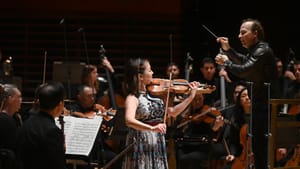Stay in the Loop
BSR publishes on a weekly schedule, with an email newsletter every Wednesday and Thursday morning. There’s no paywall, and subscribing is always free.
Welcoming spring with Stravinsky, Bartók, and Assiginaak
The Philadelphia Orchestra presents Stravinsky’s The Firebird

Golden forsythia, lime-green leaves, and blushing cherry blossoms adorn the season outside, but the musical fireworks of Igor Stravinsky’s The Firebird ballet, which unfurled with the Philadelphia Orchestra last weekend, created an even more staggering array of colors. And yes, that’s the full ballet, not the familiar, more lightly scored suites for orchestra that the revolutionary 20th-century composer extracted from his larger work.
Under the direction of Yannick Nézet-Séguin, this Firebird showcased a great symphonic orchestra at the peak of its powers. In some 45 minutes shared by nearly 100 musicians, the work developed uninterrupted, with Stravinsky’s sparkling themes taking listeners from one vibrant mood to another. Having heard the shorter suites over the course of a long listening career, I was stunned by the impact of the scoring for full ballet, with blasting Wagner tubas and staccato trumpets not so distant from winsome, twinkling celesta and xylophone.
The Firebird is based on a Russian fairy tale about a prince who, with the help of a magical firebird, saves a princess from an evil demon. The story culminates in a rapturous union of lovers, and death to the forces of darkness. In this performance, Stravinsky’s score and the orchestra’s exceptional musicianship created a space of still-standing time where we were free from all shackles that limit and oppress.
Composers against tyranny
As I left Marian Anderson Hall, alongside a drove of concertgoers floating euphorically on those final Firebird moments, I realized the entire program had a unifying thread—even if it was subliminal or coincidental. Each work had a link to a time when a tyrannical government threatened the composer’s homeland.
The Firebird of 1910, with its ominous sound of trudging boots near the beginning, may have presaged the rise of the USSR. The second work on the program, Béla Bartók’s Violin Concerto No. 2, was composed in the years before World War II. Bartók was a vocal opponent of fascism and greatly concerned about the future of his country (Hungary) as well as his personal and creative freedom. And the opening work on the program was Eko-Bmijwang (As Long in Time as the River Flows) by Barbara Assiginaak, who is Anishinaabe (born on Ontario’s Manitoulin Island). This work was commissioned by Nézet-Séguin, himself Canadian, and imagines the relationship of First Nations people to what is today called the St. Lawrence River. While the work does not directly precede an armed takeover, it does provide a poignant reflection on the centuries-long effects of colonization and disenfranchisement of Indigenous people (Assiginaak herself is a child and grandchild of residential school survivors).
Eko-Bmijwang blends allusions to river life: bird songs, shimmering discords reminiscent of shallows where willows drag their leaves. It also evokes Impressionism with touches of Ravel’s Daphnis and Chloé, against chattering creatures and the soft whistles of piccolos. With the ring of a single bell, it vanishes into silence.
An impeccable solo turn
First associate concertmaster Juliette Kang deserves abundant praise for her soloist spotlight in the Bartók. This is a difficult work with depth of character, rich in Hungarian folk influences from the initial entrance of the solo violin. Playing from memory, Kang exhibited impeccable technique and sympathetic flow with the orchestra. Her playing was confident though subdued in the first movement, gaining assertive power and intensity as the work progressed. Kang was rewarded with a full house bursting with applause and several well-deserved curtain calls.
What, When, Where
Stravinsky’s The Firebird. Igor Stravinksy, The Firebird; Béla Bartók, Violin Concerto No. 2; Barbara Assiginaak, Eko-Bmijwang. Conducted by Yannick Nézet-Séguin. Juliette Kang, violin. The Philadelphia Orchestra. April 3-5, 2025 at The Kimmel Cultural Campus’s Marian Anderson Hall, 300 S Broad Street, Philadelphia. (215) 893-1999 or philorch.ensembleartsphilly.org.
Accessibility
The Kimmel Cultural Campus is an ADA-compliant venue. Patrons can purchase wheelchair seating or loose chairs online by calling (215) 893-1999 or emailing patron services. With advance notice, patron services can provide options for personal care attendants, American Sign Language, Braille tickets and programs, audio descriptions, and other services.
Masks are not required in Kimmel venues.
Sign up for our newsletter
All of the week's new articles, all in one place. Sign up for the free weekly BSR newsletters, and don't miss a conversation.

 Linda Holt
Linda Holt